Slow Down - Icebergs Ahead!
A fair point in the Good Book Alert review of The Book of Elizabeth was the pace of the novel. I knew this was an issue back to when I completed the first draft in 2008. The primary reason the book reads as fast as it does is I was trying to cram all of this world bubbling over in my head under a hard page count given to me by the publisher. Eventually, of course, that became irrelevant.
When I took the rights back, I did consider expanding a little on the novel. At that point though, the idea of spending more time on it made me sick. I wanted to get past the book and four years of my life I felt had been wasted in waiting for it to arrive. In retrospect, I should have taken a breath and expanded on some items. The sequel will be more relaxed in pace, and won't be as hell bent on running through the world in an attempt to hit all the touristy spots before you leave town.
That said, I do kind of like the hit and run pace of the book. Read on for some thoughts on why.
A big influence on me growing up was George Lucas and Star Wars. Lucas approached the OT - not so much the PT - with the idea that he would literally show, and not tell. Lucas blitzes through the SW universe and never really stops to explain much of anything. I wouldn't equate this with the subtlety of something like Hemingway in 'Hills Like White Elephants', but it's the same principle.
I subscribe, mostly, to Hemingway's Iceberg Theory. As he said of it:
The trouble with this theory when it comes to sci-fi, fantasy, or otherwise speculative fiction is that in 'realistic fiction' (wow, I hate that term!), the reader is able to infer much of the hidden iceberg from their own life experience. In speculative fiction, the author more or less has to explain everything as there is often no frame of reference. Your mission as a writer should be to create frames of reference that allow your speculative world to have hidden depth. One way to do this is through the use of casual asides - things that hint at dimension beyond what can be seen.
Suggest. Dig out enough earth for your reader to go on as deep as he or she wants to. Some readers will absolutely want much more skin on the bones of your world - as they should. Others will be satisfied with a mere hint. Your mileage will vary as a writer.
One thing you must do is build enough of a bridge for the reader to cross. You can't bring up something - decades of X-Men plot danglers, looking at you - and then let it hang out there to dry. Suggest something, sure, but give it enough form to be durable beyond your story. Don't introduce a dozen different plot threads and then never resolve them. Present your characters and their story. Drive them around. As you do, look down that street. See something interesting. Wish you could stop.
Or take the time to stop. Do what you feel works best for your story, within its confines. Endless investigation of every alley of your world isn't going to be satisfying either - at some point, something has to happen. What interests you? Do you want to know more about this part of your world? Do you know, and can you present it without writing it? I'm curious to know.
Thoughts?
When I took the rights back, I did consider expanding a little on the novel. At that point though, the idea of spending more time on it made me sick. I wanted to get past the book and four years of my life I felt had been wasted in waiting for it to arrive. In retrospect, I should have taken a breath and expanded on some items. The sequel will be more relaxed in pace, and won't be as hell bent on running through the world in an attempt to hit all the touristy spots before you leave town.
That said, I do kind of like the hit and run pace of the book. Read on for some thoughts on why.
A big influence on me growing up was George Lucas and Star Wars. Lucas approached the OT - not so much the PT - with the idea that he would literally show, and not tell. Lucas blitzes through the SW universe and never really stops to explain much of anything. I wouldn't equate this with the subtlety of something like Hemingway in 'Hills Like White Elephants', but it's the same principle.
I subscribe, mostly, to Hemingway's Iceberg Theory. As he said of it:
If a writer of prose knows enough of what he is writing about he may omit things that he knows and the reader, if the writer is writing truly enough, will have a feeling of those things as strongly as though the writer had stated them. The dignity of movement of an ice-berg is due to only one-eighth of it being above water. A writer who omits things because he does not know them only makes hollow places in his writing.
The trouble with this theory when it comes to sci-fi, fantasy, or otherwise speculative fiction is that in 'realistic fiction' (wow, I hate that term!), the reader is able to infer much of the hidden iceberg from their own life experience. In speculative fiction, the author more or less has to explain everything as there is often no frame of reference. Your mission as a writer should be to create frames of reference that allow your speculative world to have hidden depth. One way to do this is through the use of casual asides - things that hint at dimension beyond what can be seen.
Suggest. Dig out enough earth for your reader to go on as deep as he or she wants to. Some readers will absolutely want much more skin on the bones of your world - as they should. Others will be satisfied with a mere hint. Your mileage will vary as a writer.
One thing you must do is build enough of a bridge for the reader to cross. You can't bring up something - decades of X-Men plot danglers, looking at you - and then let it hang out there to dry. Suggest something, sure, but give it enough form to be durable beyond your story. Don't introduce a dozen different plot threads and then never resolve them. Present your characters and their story. Drive them around. As you do, look down that street. See something interesting. Wish you could stop.
Or take the time to stop. Do what you feel works best for your story, within its confines. Endless investigation of every alley of your world isn't going to be satisfying either - at some point, something has to happen. What interests you? Do you want to know more about this part of your world? Do you know, and can you present it without writing it? I'm curious to know.
Thoughts?



Comments